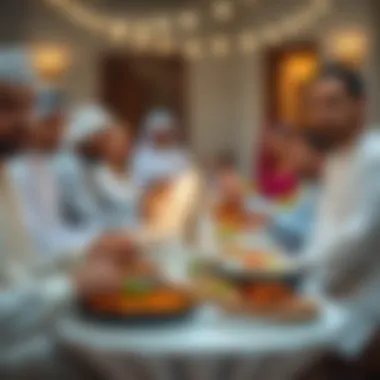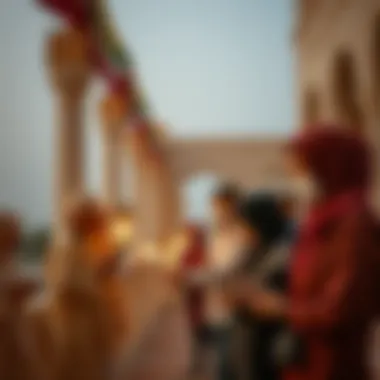Ramadan in the UAE: Cultural Practices and Real Estate Effects


Intro
Ramadan, the holy month of fasting and reflection, is more than just a time for spiritual growth in the United Arab Emirates. It intertwines deeply with the fabric of Emirati culture, shaping social norms, community interactions, and even the economy. As the sun sets each evening, the stillness of the day is replaced by vibrant iftar gatherings and nightly prayers, marking this period as a time of unity and connection, both among locals and expatriates alike.
The cultural landscape during Ramadan is rich and varied, reflecting the diverse populace of the UAE. From traditional dishes served at iftar to the communal prayers that fill the mosques, each element adds to the tapestry of local life. However, the significance of Ramadan goes beyond just cultural retention. As businesses close for daytime fasting, the economy experiences shifts that can directly impact real estate trends, investment patterns, and property demands.
In the following sections, we will examine the intersection of Ramadan's cultural reflections and the real estate sector in the UAE, guiding investors, expats, and residents on what to expect during this transformative month.
Understanding Ramadan in the UAE
The holy month of Ramadan holds profound significanace in the UAE, extending far beyond mere fasting. It's a period infused with collective spirituality, cultural introspection, and community bonding that shapes the lifestyle of both locals and expatriates alike. Understanding Ramadan in this context offers valuable insights into the UAE's societal fabric and presents opportunities for investors and real estate professionals to grasp the dynamics of the market during this unique time.
The interplay of traditions and modern practices during Ramadan provides a backdrop to how life unfolds in the UAE. Engaging with the various customs, activities, and shifts in daily routines gives one a clearer vision of how the month impacts commercial activities, community interactions, and even residential preferences. This understanding can guide stakeholders in anticipating changes in consumer behaviors, which is crucial for navigating the real estate market effectively.
"Ramadan is not just a month of fasting; it’s a canvas illustrating the vibrant culture of the UAE, where old traditions meet modernity."
Historical Context
To appreciate the essence of Ramadan, it’s essential to acknowledge its historical significance. Rooted in Islamic teachings, Ramadan commemorates the month in which the Quran was revealed to Prophet Muhammad. This month of reflection, self-discipline, and spirituality showcases the UAE's rich cultural heritage, influenced by Bedouin traditions and Islamic faith. The UAE, while modernizing at a remarkable pace, takes pride in maintaining its ancient roots, with the month serving as a reminder of the unity and destinty shared among its people.
Over time, Ramadan in the UAE has adapted to include contemporary elements that cater to a global audience. Major cities like Dubai and Abu Dhabi see an influx of tourists, allowing Islamic traditions to amalgamate with various international cultures. This exchange contributes to a dynamic atmosphere, enriching experiences during the month.
Cultural Significance
Culturally, Ramadan serves as a unifying factor in the UAE, reinforcing bonds among family, friends, and the community. It is a period filled with rituals, where the act of fasting transcends physical abstention, leading to spiritual growth and enhanced empathy towards those less fortunate. As the sun sets, the communal spirit comes alive through Iftar gatherings, where diverse groups gather to break their fast, sharing meals and fostering connections.
Moreover, the month underscores the practice of Zakat—charitable giving—which plays a vital role in societal welfare. Such actions not only uplift the community but also cultivate a sense of belonging and responsibility among residents. Understanding these cultural nuances enables real estate professionals to better engage with their clientele, recognizing the importance of community ties and shared values in making housing decisions.
Through this lens, one can see that Ramadan is much more than a holy month; it is a reflection of the UAE’s identity as a harmonious blend of tradition and progress.
The Rituals of Ramadan
The month of Ramadan stands out as a cornerstone in the cultural and spiritual fabric of the UAE. During this significant period, various rituals imbue the daily lives of individuals with meaning and purpose. The practice of fasting, the tradition of Iftar gatherings, and the evening Taraweeh prayers play crucial roles in transforming the atmosphere. Each of these elements not only shapes individual experiences but also has pivotal implications for community cohesion and even real estate dynamics in the region. Understanding these rituals can provide investors and expats with valuable insights into the local culture and its impact on various sectors.
Fasting Practices
Fasting during Ramadan is one of the Five Pillars of Islam, serving as both a spiritual discipline and a rite of passage. From dawn until sunset, Muslims abstain from food and drink. It’s about self-restraint and reflection. The fast is designed to foster empathy for those less fortunate, heightening an awareness of hunger and need. This practice goes beyond mere abstention; it encourages personal growth and spiritual enlightenment.
In the UAE, you will notice significant adaptions in the workplace and public life to accommodate these fasting practices. Most companies adjust their working hours to ensure employees can maintain their fast without compromising productivity. In some sectors, working hours might be shortened, allowing for a proper balance between work commitments and the spiritual obligations of Ramadan. Some businesses even offer special meals tailored for Suhoor, the pre-dawn meal, showing an understanding of this unique lifestyle.
Iftar Gatherings
As the sun sets, families and friends come together to break their fast, marking a cherished ritual known as Iftar. This daily gathering reflects community spirit and familial bonds. The act of sharing a meal creates an atmosphere of unity and joy. Restaurants across the UAE offer elaborate Iftar buffets that include traditional dishes such as dates, lentil soup, and biryani, elevating the culinary experience to new heights. Such gatherings serve more than just hunger; they foster connections among people, strengthening social ties.
Moreover, the Iftar experience can spin off economic benefits. Restaurants see increased patronage, which directly influences the hospitality sector. Property managers and realtors may notice spikes in activity around dining establishments, as potential residents value proximity to places that host vibrant Iftar gatherings. Often, areas with strong community engagement during Ramadan can become more attractive for property investment.
Taraweeh Prayers
Taraweeh prayers are held every night of Ramadan after the obligatory Isha prayer. It’s a special time dedicated for reflection and spirituality. The prayers can last over an hour and are conducted in mosques, where large crowds gather. For many, participating in these nightly gatherings is not just about the prayer itself, but also about camaraderie and a shared experience of faith.
Attending Taraweeh helps reinforce community bonds. The prayers are often celebrated with fervor, as folks from diverse backgrounds join together. Each mosque typically accommodates those who wish to partake, creating moments where cultures converge in harmony.
In the broader context, the increased footfall in mosques can impact nearby property values. Areas surrounding popular mosques often experience real estate interest, both for residential and commercial purposes. Investors and developers can recognize Taraweeh's significance as a stimulating factor for neighborhood desirability.
"The rituals of Ramadan go beyond religious obligations; they encapsulate the essence of community, connection, and cultural identity in the UAE."
In summary, the rituals during Ramadan—fasting, Iftar, and Taraweeh—do much more than fulfill spiritual obligations; they shape lives, strengthen communities, and distinctly influence real estate opportunities in the UAE. Understanding these elements allows investors and residents alike to navigate the unique cultural landscape effectively.
Community and Charity During Ramadan
Ramadan is not just a period of fasting; it's a time when the spirit of community and the importance of charity come to the forefront in the UAE. Such themes resonate deeply within the fabric of society and offer broader implications for understanding cultural practices, economic behavior, and even real estate dynamics. As the entire month is dedicated to spiritual reflection and connection, the collaborative efforts in community engagements and charitable activities highlight how people come together in a shared purpose. This creates a unique atmosphere that envelops urban living, inviting both residents and visitors to engage more closely with their environments and each other.


Zakat and Philanthropy
Zakat, the mandatory form of almsgiving, significantly influences how many individuals perceive their financial contributions during Ramadan. In the UAE, there are extensive frameworks that guide the distribution of Zakat, ensuring it reaches those who truly need it. While there are numerous channels through which one can fulfill this obligation, the underlying principle remains the same: enhance the common good and strengthen community bonds.
For instance, local mosques and charitable organizations frequently become hubs for collective Zakat efforts, facilitating the process and increasing the impact. The spirit of giving resonates not just within the local populace; expatriates, too, often engage actively, contributing to funds intended for both humanitarian needs and infrastructural development in less fortunate neighborhoods.
The vast majority of Ramadan-specific charity campaigns see a notable increase during this month. Organizations such as the UAE Red Crescent and various local charities often organize initiatives that encourage people to donate food, clothing, and financial resources to support less fortunate families. This brings an added dimension to community life during Ramadan, with individuals witnessing firsthand the direct impact of their contributions.
Community Events
In parallel to the philanthropic spirit of Ramadan, the creation of community events plays a fundamental role in nurturing social bonds. From Iftar gatherings to community fairs, Ramadan is ripe with opportunities for residents to come together.
Families and friends often host large Iftar dinners, inviting neighbors and even newcomers to share the evening meal. Such exchanges foster relationships, creating a sense of belonging and inclusivity across diverse cultural backgrounds. Additionally, many local organizations and community centers have begun to host open-air Iftar events that not only feed the hungry but also serve as platforms for dialogue and cultural exchange.
Consider a few of the community events that can be found around the UAE during Ramadan:
- Charity iftar gatherings organized by neighborhoods
- Cultural exhibitions highlighting Ramadan traditions
- Community sports events to encourage physical activity while breaking the fast
- Workshops focusing on cooking traditional Ramadan meals
As such, these gatherings serve as more than mere meals—they become dynamic points of interaction that strengthen ties among a diverse populace. Residents, expats, and even tourists find common ground, showcasing the cultural richness of the UAE during this holy month.
"During Ramadan, the essence of giving and community comes alive—it's not just about what you receive but what you willingly give back."
The intertwining of Zakat and community events illuminates the unique ways Ramadan influences societal behaviors and connects people through shared aspirations, making it a vital consideration for anyone keen on understanding the broad landscape of the UAE's social and economic environment.
Economic Impact of Ramadan
Understanding the economic impact of Ramadan in the United Arab Emirates offers insights into how this sacred month does not just reshape cultural practices, but it also alters market behaviors and economic engagements. The blend of tradition and commerce sees unique shifts especially in sectors like retail, hospitality, and real estate that are heavily influenced during this period. Knowing how Ramadan affects these areas is essential for investors and businesses, as well as expats and residents looking to navigate this evolving landscape.
Market Dynamics
The market dynamics during Ramadan witness a significant surge in various sectors. Retail businesses, especially those in food and beverage, see unprecedented sales figures in the lead-up to and throughout the month. Supermarkets and grocery stores report a notable uptick in demand for dates, sweets, and cooking essentials, as families prepare for Iftar meals.
- Retail Sales Spike: Estimates show that retail sales during Ramadan can increase by as much as 30% compared to non-Ramadan periods. This jump is attributed to the reception of gifts and the preparation for community engagement during Iftar.
Furthermore, leisure and entertainment sectors also experience transformation.
- Hospitality Hustle: Restaurants traditionally shift their operating hours to accommodate Iftar and Suhoor. Many establishments provide special menus to cater to the post-fasting crowd, enhancing customer experiences through festive decorations and live entertainment.
- Events and Festivals: Malls and public spaces often host Ramadan festivals which boost foot traffic, thus benefiting not only retailers present but also nearby businesses. These festivals play a crucial role in connecting community members and fostering a sense of togetherness during the holy month.
"The response from consumers is palpable. It’s no longer just about breaking fast; it’s a chance to connect, celebrate and spend that extra dirham alongside family and friends."
Consumer Behavior Changes
As Ramadan unfolds, consumer behaviors shift distinctly in both spending and purchasing patterns. Understanding these changes can be advantageous for businesses, as they inform marketing and operational strategies.
- Increased Spending on Food: A striking observation is the increase in spending on food items, which often doubles during Ramadan. A correlation can be drawn between cultural practices, such as extravagant Iftar meals, and the rise in purchasing power observed in Dubai and Abu Dhabi.
- Luxury Goods Boom: Interestingly, there’s usually a rise in luxury goods purchases, as families and individuals seek to present themselves well during gatherings and celebrations. This phenomenon reflects a blend of cultural expectations and personal values during Ramadan.
- Online Shopping Growth: There's also a noticeable shift toward e-commerce, with online platforms experiencing heightened traffic as individuals avoid the heat and crowds in stores. Retailers that adapt their strategy to include online promotions or exclusive Ramadan offers often see rewarding returns.
The men's fashion market, for instance, has seen growth as traditional attire becomes a focal point during Ramadan events. From the kandura in the UAE to tailored suits for evening gatherings, the fashion narrative weaves itself into the larger tapestry of consumer behavior.
In summation, recognizing the economic impact of Ramadan is not just about understanding fluctuations in sales figures or market trends; it's about comprehending the profound interplay between cultural practice and market dynamics. The effects stretch across various sectors, especially in real estate, where demand for space for events, gathering, and dining rises, making understanding these dynamics crucial for any investor or stakeholder within the UAE.
Ramadan and the Real Estate Market
Ramadan holds unique significance in the UAE, shaping not just cultural norms but also impacting various economic sectors. The real estate market is particularly sensitive during this period, as the rituals and festivities engender shifts in consumer behavior and investment patterns. Observing these trends offers significant insights into how property dynamics evolve during the holy month. While it might seem primarily a spiritual time, the intersections between real estate and Ramadan can't be overlooked, making it crucial for investors and property stakeholders to comprehend these subtle yet impactful changes.
Investment Trends
During Ramadan, potential fluctuations in the real estate market are not uncommon. These trends can be multifaceted, often driven by heightened community spirit and cultural engagement.
- Increased Demand for Rental Properties: As expatriates flock to the UAE for the holy month, there tends to be an increase in demand for short-term rentals. This uptick is not just a product of tourists; local families often look to accommodate guests and relatives during this time, leading to a competitive rental market.
- Promotional Offers: Real estate developers often seize the opportunity to introduce tailored promotions during Ramadan, enticing buyers with incentives like reduced prices or deferred payment plans. Such offers become attractive during a month when families are likely thinking about housing arrangements.
- Community-Driven Developments: There’s a notable rise in projects emphasizing community living. Investors are more likely to back developments that feature shared spaces for cultural and social gatherings, resonating with the essence of Ramadan.
Furthermore, with property managers often adapting their strategy to attract tenants during this period, understanding local customs can be invaluable. The harmony between spirituality and commerce can create a unique landscape for those keeping their ears to the ground.
Rental Market Activity


The rental market experiences a vibrancy during Ramadan that can lead to both challenges and opportunities. Potential investors must grasp how this unique period shapes rental dynamics.
- Peak in Short-Term Rentals: Properties listed on platforms like Airbnb often see a surge in bookings during Ramadan as families and friends come together for iftar. This can create lucrative opportunities for landlords who adapt their offerings to meet the demand.
- Extended Lease Considerations: With many families hosting guests, landlords might find potential tenants willing to extend leases, thus ensuring steady income over the month. Likewise, this activity can lead to longer lease agreements post-Ramadan if sentiments are favorable.
- Impact on Pricing Strategies: Landlords may readjust pricing strategies based on the demand surges. With more people looking to secure housing, rental prices could potentially rise — although this is also contingent upon regional regulations and economic conditions.
"Understanding the interplay between Ramadan and the rental market is essential for sustainability in property management during this sacred time."
Hence, recognizing these trends can equip stakeholders in the real estate sector, ensuring they remain responsive to changes in the market landscape during this pivotal cultural period. Investors can hone their strategies, adapting to the demands presented by the community's needs, while homeowners might find new dynamics at play that are worthy of consideration.
Ramadan Influences on Local Residents
The holy month of Ramadan weaves itself deeply into the fabric of life in the UAE, influencing not just the spiritual dimensions but also the everyday experiences of local residents. Understanding how Ramadan shapes lifestyles and fosters community cohesion offers valuable insights, especially for investors and property developers who wish to connect with the nuances of the market during this period.
Lifestyle Adjustments
As Ramadan unfolds, local residents make significant lifestyle adjustments to accommodate fasting and prayer. During this time, work hours might shift, with many offices adjusting schedules to allow employees to break their fast with their families. For instance, it’s common to see work hours shortened or staggered. This shift not only reflects the cultural considerations inherent in the month but also highlights the importance of family values prevalent in the UAE. Families often gather around the table for I'm fast breaking, focusing on creating a mutually supportive environment.
Challenges are present, too. Fasting can bring about fatigue, and some individuals struggle with balancing their professional responsibilities while adhering to spiritual practices. Furthermore, non-Muslim residents may also adapt by respecting fasting hours, refraining from eating in public and being more conscious of their surroundings. This adjustment underscores a sense of respect and understanding across cultural boundaries, enhancing communal harmony.
Key adjustments include:
- Changes to daily routines, including work hours and family gatherings
- Increased focus on meal preparations and healthy eating habits during Suhoor and Iftar
- Respectful behavior in public spaces, particularly toward those observing the fast
The economic impact of these lifestyle changes is multifaceted. Restaurants may see a shift in hours, catering primarily to Iftar diners after sunset, which can lead to a spike in customer turnout. This behavior can affect decisions made by property investors looking at the hospitality sector.
Community Cohesion
Ramadan serves as a catalyst for strengthening community bonds in the UAE. The month brings people together in various ways, leading to richer interactions within communities. Events, whether religious or social, proliferate, fostering environments where goodwill flourishes. For instance, neighborhood gatherings for Iftar allow diverse groups of people to share meals, showcasing a blend of cultural heritage.
Additionally, charitable practices during Ramadan, such as organizing food drives or community iftars, become more pronounced. Residents unite to help those less fortunate, which not only strengthens ties but also promotes a sense of belonging and shared responsibility. As property developers observe these trends, it often translates to opportunities in both residential and commercial developments.
"The spirit of Ramadan nurtures a unique sense of togetherness, making the community fabric stronger and deeper, and that’s something that resonates throughout the year."
In this climate of togetherness, social initiatives abound, from community bulletin boards inviting locals to join for prayers, to potluck-style iftars where everyone contributes a dish. Such communal practices signal to investors that areas rich in social activities may retain higher property values over time. Understanding these cultural and social shifts is crucial for effective engagement within the local real estate market.
Community events during Ramadan often include:
- Group Iftar meals in public spaces
- Charity runs or events that raise funds for local needs
- Collaborative activities like community gardens, promoting sustainability alongside social ties
Real Estate Opportunities During Ramadan
Ramadan is a unique time in the United Arab Emirates, presenting distinct real estate opportunities that investors and property managers may want to capitalize on. This month is not only a period of spiritual reflection but also a time when community spirit is palpable, leading to various market dynamics that can significantly influence property transactions. The increase in community engagement and communal activities during Ramadan creates an ideal environment for real estate promotions and neighborhood developments. Let's delve deeper into how this month shapes the economic landscape.
Promotions and Deals
During Ramadan, many property developers and realtors often roll out attractive promotions and deals. These can range from discounted rental rates to incentives for buyers making new purchases. Indeed, it is common to find limited-time offers that can drastically lower costs. This trend is beneficial for both sellers and buyers:
- For Investors: Special financing arrangements or reduced fees can create a favorable investment climate.
- For Buyers/Renters: Many are motivated to secure properties with the expectation of increased prices after the holidays.
As families gather together, there’s typically a surge in demand for larger homes and villas, particularly those in family-friendly neighborhoods. Moreover, the timing of Ramadan aligns with the cycle of many expatriates relocating to the UAE, thus companies often look to attract tenants by offering enticing deals on properties. In neighborhoods known for their multicultural communities, such as Dubai Marina or Al Nahda, one can frequently observe these promotions in full swing.
"The best time for real estate bargains is often under the stars of Ramadan, where irresistible deals illuminate the market."
Emerging Areas of Interest
As market dynamics shift during Ramadan, certain emerging areas gain attention from potential investors and renters. These neighborhoods might not have been on the radar prior to this month but become sought after due to their unique offerings and community spirit. Areas such as Dubai Creek Harbour and Jumeirah Village Circle (JVC) have shown signs of growth due to their family-focused designs and proximity to community hubs.
Investors should keep an eye on:
- Location Accessibility: Properties that offer easy access to mosques and community centers often become favored choices.
- Cultural Adaptations: Developments that incorporate cultural elements—like traditional marketplaces or communal spaces for Iftar gatherings—tend to attract more interest during Ramadan.
- Sustainability Features: There’s also a growing trend towards sustainable living options, advocating for eco-friendly housing that aligns with the teachings of Ramadan regarding resourcefulness and harmony with nature.
In summary, Ramadan is an opportune time for navigating the real estate landscape in the UAE. It opens doors for unique investment possibilities, particularly through targeted promotions and emerging neighborhoods reflecting the spirit of the holy month. For investors and property managers, paying attention to these trends can yield significant returns and ensure a strong foothold in a competitive market.
Resident Experiences in Ramadan


Ramadan in the UAE is not just a religious observance; it's a communal experience that shapes the fabric of daily life. For residents, this month is a time to reflect, connect, and engage in meaningful traditions that transcend mere fasting. The significance of resident experiences lies in how they foster a sense of belonging and highlight the diversity of cultures in the nation. During this holy month, one sees the melding of various customs and rituals, making each individual's celebration unique, yet part of a larger tapestry of shared communal life.
Culinary Traditions
Culinary traditions during Ramadan stand out as one of the most anticipated elements. Food plays a central role in the observance of this month, with families enthusiastically preparing meals to break their fast after sunset. The communal spirit during Iftar (the meal to break the fast) is palpable, where tables are laid with a range of dishes that reflect not only local flavors but also international influences.
From dates and laban to biryani and various sweets, the spread showcases the culinary diversity within the UAE. Notably, the act of sharing meals is a symbolic gesture of unity. Restaurants offer special Iftar menus that bring together flavors from across the globe, allowing residents and expatriates to indulge in new tastes while reconnecting with familiar dishes. This culinary celebration not only satiates hunger but also serves as a bridge connecting different cultural backgrounds.
"The fragrance of spices and the sound of laughter during Iftar create a welcoming atmosphere for everyone, fostering a strong sense of community among residents."
Family Gatherings
Family gatherings gain particular importance during Ramadan, becoming moments of joy and togetherness. As days grow shorter, families prioritize coming together for meals and prayers, solidifying bonds and enhancing relationships. For many, these gatherings are opportunities to share stories, laughter, and experiences from the past year.
Each night of the month feels like a mini-celebration, where conversations flow as freely as the food. Homes often resonate with a warmth that makes one feel at ease. The act of breaking bread with loved ones serves as a reminder of the blessings they share. As the month progresses, the cadence of family visits increases; it's not uncommon to find neighbors exchanging invitations, fostering a spirit of camaraderie.
The importance of these family meetings is also reflected in the neighborhoods, where homes light up with gatherings. Young children playfully interact while elders share wisdom and support, creating a vibrant mix of generations. The goodwill generated extends beyond the confines of home, encouraging others in the community to also partake in the warmth of family and friendships.
In summary, resident experiences during Ramadan epitomize the essence of communal living in the UAE, where culinary, cultural, and familial ties converge. Understanding these aspects can provide investors, realtors, and developers with insights into the local lifestyle, aiding them in tapping into the market's emotional and cultural dimensions.
Challenges Faced During Ramadan
Ramadan brings about a unique set of challenges, not just spiritually, but also in practical everyday life. As the holy month unfolds, it significantly impacts both personal life and business operations in the UAE. Addressing these challenges is crucial for understanding how the month reshapes social dynamics and economic activities.
Balancing Work and Fasting
Treading the line between work obligations and the reality of fasting can be quite a juggling act. Many individuals find it hard to maintain productivity during the long hours of fasting. With sunrise to sunset marking the fasting period, energy levels dip, making it tricky for employees to keep their performance up to par, especially in demanding roles.
On top of that, work hours often get adjusted during Ramadan. Companies sometimes shift to shorter schedules, but not all jobs have that luxury. Employees might have to contend with their usual workload while coping with fasting, which can lead to fatigue and decreased focus.
Key Considerations:
- Employers need to acknowledge the fast and offer flexibility where possible.
- Companies can consider hosting iftar meals to contribute to team cohesion and goodwill.
- Special training or workshops can help staff manage their time more effectively during this month.
Such measures create a supportive environment that recognizes the spiritual journey of employees while maintaining business goals.
Logistical Issues
Navigating the logistical landscape during Ramadan poses its hurdles. With evenings bustling due to iftar gatherings and communal prayers, traffic tends to become a nightmare. Residents often plan their meals or social engagements around iftar timings, leading to crowded highways and-packed public transport.
Moreover, food delivery services see increased demand as families opt for convenience after the long fasting hours. This rush can put a strain on logistics, making it hard for some services to meet expectations, leading to delays and frustration.
Practical Implications:
- Traffic Disruption: High congestion near mosques and popular restaurants can delay daily commutes.
- Service Availability: Increased demand for food delivery and other services often leads to overwhelming pressure on local businesses.
- Distribution Challenges: Harder for stores to keep up with the surge in demand for essentials.
In short, tackling these logistical challenges requires careful planning from both residents and businesses. This planning not only smooths the daily flow of life but also fosters a sense of community by ensuring that everyone can participate fully in the rich tapestry of Ramadan activities.
Recognizing and addressing these challenges adds depth to our understanding of this holy month. It brings together the essence of community, faith, and daily life in the UAE.
Future Perspectives
The examination of future perspectives during Ramadan provides a crucial lens through which to evaluate shifts in cultural practices, communal engagement, and economic activities within the UAE. This analysis is especially pertinent for investors and real estate professionals. Understanding these anticipated changes can help stakeholders make informed decisions in a constantly evolving landscape.
Anticipated Changes
As the UAE continues to grow as a global hub, the impact of Ramadan is likely to evolve significantly. Several anticipated changes worth noting include:
- Increased Investment in Community Spaces: Developers may focus more on enhancing community spaces and public parks where people can gather during iftar. This shift aligns with cultural values as these areas foster stronger community ties.
- Adoption of Technology in Celebrations: From streaming religious services to using apps that remind individuals of prayer times, technology integration is becoming more prominent. This trend resonates with the younger generation and may lead to new startups targeting this niche.
- Sustainability Practices: As more individuals become environmentally conscious, Ramadan may see a wider adoption of sustainable practices in food distribution and event planning. This aligns with global trends towards sustainability, potentially impacting businesses within the sector.
- Shift Towards Remote Engagement: The rise in digital platforms could change how people celebrate Ramadan, particularly in a post-pandemic landscape. Virtual iftars and online community events might herald a new norm, influencing social dynamics.
"Understanding the shifts in communal traditions can illuminate new pathways for economic growth during Ramadan."
Long-Term Effects on Real Estate
The long-term effects of Ramadan on the real estate sector can signify significant shifts in investment and development strategies. The following points provide insight into these changes:
- Increased Demand for Residential Properties: As families come together for the holidays, there may be a greater emphasis on larger residential units that can accommodate gatherings. Mixed-use developments that combine residential and commercial properties could become increasingly favorable.
- Re-examination of Commercial Leasing: Retail spaces and restaurants catering to Ramadan-related traditions may need to adjust their offerings or experiences to appeal to changing consumer preferences. This trend could reshape leasing contracts and influence pricing in key areas.
- Cultural Amenities as Selling Points: Properties showcasing cultural amenities related to Ramadan, such as proximity to mosques or community centers, may see increased value. Homebuyers and investors often seek these unique selling propositions, impacting market prices.
- Adjustment of Marketing Strategies: Real estate marketers will need to innovate, looking for fresh ways to connect with potential clients during Ramadan. This may include targeted campaigns that resonate with cultural sentiments, thus enhancing engagement.
In summary, the future perspectives regarding the cultural and economic landscape during Ramadan in the UAE will require ongoing analysis. Stakeholders must remain keen observers of these changes, adapting to the shifting environment to seize new opportunities.















